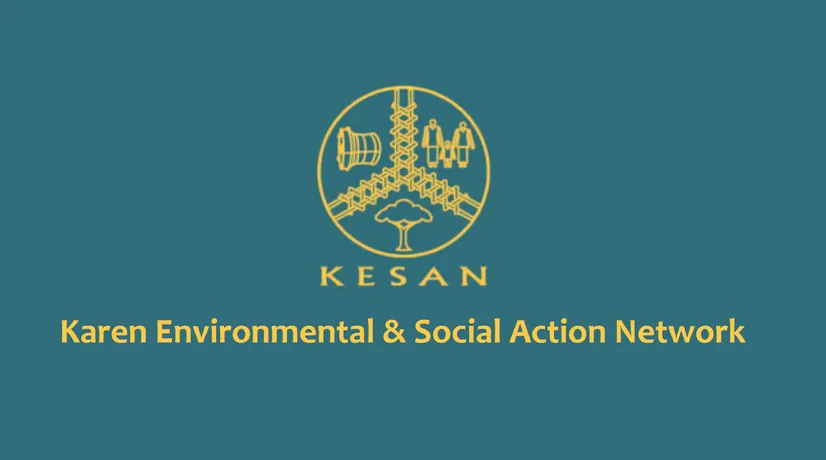Statement from Karen Rivers Watch for International Day of Action for Rivers and Against Dams
14 March 2025

On March 14, 2025, in honour of the International Day of Action for Rivers and Against Dams, the indigenous Karen people living along the Salween River, in collaboration with Karen civil society organizations and environmental activists, gathered on the Salween Riverbank to issue a statement. The declaration emphasizes the free flow of Myanmar’s rivers, calls for the termination of the Salween Dam projects, and the recognition of indigenous peoples’ rights to peace and self-determination.
Rivers sustain the environment and ecosystems, support biodiversity, and uphold the dignity and survival of the communities that depend on them. Likewise, they serve as a vital source of livelihood for ethnic groups through fishing, trade, and agriculture. Beyond their ecological and economic significance, rivers also hold profound cultural, traditional, and spiritual importance for these communities. Previous governments entered into agreements for the construction of dam projects on Myanmar’s rivers, primarily for electricity generation, without consulting local communities. Instead, Myanmar continues to face an electricity shortage, and disrupted livelihoods.
Mining activities have been accelerated throughout the country without the consent of the indigenous people, resulting in the loss of land, deforestation, and the pollution of rivers and streams. Because of the current political situation, people are relying more and more on natural resources to meet their daily needs due to rising commodity prices and a lack of job opportunities. In 2024, heavy and unusual rainfall led to flooding, damaging the homes, agriculture, and food security of the indigenous Karen people. If environmental degradation in Myanmar is not addressed urgently, climate change repercussions will continue to threaten the livelihoods and resilience of these communities in the long term.
Following the 1027 operation that began in 2023, the push to implement Salween dam projects in Northern Shan State is gaining more potential, leading to military conflicts and environmental crises for the local communities. Especially after the Chinese-backed United Wa State Army (UWSA) took control of large areas in northern Shan State in July 2024, the Kunlon Dam and the Naungpha Dam emerged as potential projects. This has raised significant concerns about the future of the Salween River, one of Southeast Asia’s last free-flowing rivers, and the well-being of the local populations.
The indigenous Karen people have long opposed the Salween Dam project as part of their efforts to protect the environment and preserve local ecosystems. In particular, Indigenous Community Conserved Territories (ICCTs) have been formally recognized as areas where the Karen people engage in environmental conservation, grounded in principles of equality, participatory decision-making, and community-led governance. These initiatives foster democracy, peace, and justice, while emphasizing the reciprocal relationship between human communities and natural resources, thereby advancing a sustainable and peaceful future for the indigenous Karen people.
Today, we call an end to resource extraction projects that exploit the land without the consent of the local communities, and advocate for the recognition of the fundamental right of rivers to flow freely.
To ethnic revolutionary groups
- To halt resource extraction projects being carried out without public consent and oppose the Salween Dam projects, which are detrimental to the environment and social well-being.
- To acknowledge and safeguard the environmental conservation practices of indigenous communities.
- To develop resource management policies that protect the public and strengthen sustainable natural resource management systems.
To NUCC/ NUG
- To collaborate with civil society organizations and urge international stakeholders to take immediate action to support local communities affected by excessive resource extraction.
- To recognize and follow (bottom-up) federal system of natural resource policies based on ownership, management and revenue sharing.
- To promote the free flow of Myanmar’s rivers, including the Salween, Irrawaddy, and others.
To International Communities
- To reject the legitimacy of the military council as a government.
- To stop financial support for the military council and its economic corporations
- ASEAN should review the agreement and collaborate with ethnic revolutionary organizations, since the military council has failed to comply with ASESA’s five- point consensus.
Contact:
- Naw Hsa Moo – +66 979958177 (Karen, English)
- Saw Hea Say – +66 930855326 (Burmese, English)
Announcements
21 May 2025
Open letter: Malaysia must lead ASEAN with principle, not hypocrisy, to address the Myanmar crisis

Progressive Voice is a participatory rights-based policy research and advocacy organization rooted in civil society, that maintains strong networks and relationships with grassroots organizations and community-based organizations throughout Myanmar. It acts as a bridge to the international community and international policymakers by amplifying voices from the ground, and advocating for a rights-based policy narrative.